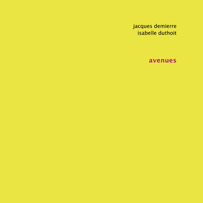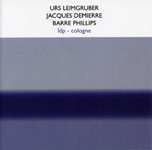Home » Jazz Articles » Multiple Reviews » The many sides of pianist Jacques Demierre: solo, duo and trio
The many sides of pianist Jacques Demierre: solo, duo and trio
 Jacques Demierre
Jacques Demierre
One Is Land
Creative Sources
2008
Demierre's last solo album, Black/White Memories (Insubordinations, 2006)—which you can still download from the Insubordinations website—sounded very experimental and exploratory. Demierre played inside the instrument for much of the time, sometimes sounding as if his piano was prepared so as to muffle its sound, judging by the deadness of some of the lower frequencies. These were offset by clear top end notes, played or plucked inside. At times, particularly towards the end, it sounded as if Demierre's piano was receiving serious abuse. The whole album painted a picture of an innovative and adventurous player.
One is Land, recorded in April 2007 in Berlin, reinforces that picture. It features two long contrasting compositions each with its own logic and style. The first, "Sea Smell," opens with a thunderous chord that sets the tone for the full twenty-three minutes. Demierre follows that chord up by piling up a tumult of low end chords, layer upon layer, overlaid with occasional snatches of top end. As the chords endlessly resound, it becomes impossible to distinguish developments as they are being added, and the whole takes on the characteristics of a steady-state drone piece. The whole piece is a thrilling adrenalin rush.
The second piece, "Land Smell," is in total contrast. It lacks the first piece's relentless energy, replacing it with a focus on small gestures which give an impressionistic feel to the piece. Occasionally, Demierre invests certain patterns of notes with great significance by repeating them or exploring their possibilities, as close to conventional jazz playing as he gets here. As on Black/White Memories, there is a focus on playing inside and preparation, areas in which Demierre clearly excels. Taken together, the two pieces paint a positive picture of Demierre as a varied and imaginative solo player.
 Jacques Demierre & Isabelle Duthoit
Jacques Demierre & Isabelle Duthoit
Avenues
Unit
2008
On first listening, this duo belies the expectations created by the credits. The pairing of Demierre's piano with Isabelle Duthoit's clarinet and voice may conjure up expectations of some quasi-classical chamber recital, with the piano fulfilling the role of accompaniment. This is emphasised by the eight pieces being credited as joint Demierre-Duthoit compositions, all titled in French. Surely, they must be songs...
The reality is strikingly different: together and separately, both players strive to counteract such expectations. The end result is far closer to straight improvised music than to chamber improv. Rather than prolonged duo passages, it is more common for the players to exchange solo passages, each reacting to the other in turn. Demierre frequently punctuates the music with one or two isolated notes that ring out, giving it a freshness and openness. In addition, the exchanges are often punctuated by silences, creating some of the restrained flavor of electro-acoustic improv.
These are not songs; Duthoit's vocal sounds consist not of singing, but of breathing and other extraneous noises. On "Beaucoup est non disponsible," she emits a series of heart-rending screams and howls before employing her clarinet to supply some breathy sounds before it also adds its own screams. Demierre supplies percussive accompaniment before introducing chords that bring this well-structured piece to a satisfying conclusion. Fine duo playing.
 Jacques Demierre / Barry Guy / Lucas Niggli
Jacques Demierre / Barry Guy / Lucas Niggli
Brainforest
Intakt
2004
Together for some five years before this fine debut release, this trio radiates understanding of each other and a sense of unity. The line-up of piano, bass and drums would suggest that this could be a standard model jazz piano trio, but that is far from the truth. Instead they produce a programme of improvisation in which there is an equality between the instruments and players and an ebb and flow among them.
Although Demierre is not the main focus, his energy and variety shine through as he displays some of the qualities discussed above. On "Giardino Calante," his prepared piano adds clusters of chords to slowly build a densely woven piece. Demierre does not dominate it though; Lucas Niggli's drumming frequently matches the piano's energy, while Barry Guy drives things along more subtly. The title track, "Brainforest" itself, is a meeting of equals as all three play together throughout its duration, slowly building momentum, with Demierre soloing relentlessly.
 Urs Leimgruber, Jacques Demierre, Barre Phillips
Urs Leimgruber, Jacques Demierre, Barre Phillips
LDP—Cologne
Psi
2005
The trio of saxophonist Urs Leimgruber, Demierre and bassist Barre Phillips contrasts with the last trio, largely because the different instrumentation alters its approach and focus. In his sleeve note, Evan Parker says that this group continues the tradition of the drummerless trio in improvised music and that, with Phillips present, the continuity extends all the way back to the legendary Jimmy Giuffre Trio. In fact, this trio's instrumentation of sax plus piano and bass mirrors that of the Giuffre, Paul Bley and Steve Swallow version that recorded Free Fall (Columbia, 1962)—not a bad point of comparison, although this trio is not as restrained or quiet as that Giuffre trio.
Leimgruber's sax is the main focus, and Demierre comes close to acting as a support player. But even when he is adding chords as coloration and punctuation, there is always a sense that he will burst into life, like a volcano erupting. Sure enough, this happens on the standout track, "The Rugged Cross," which explodes like a bomb in the middle of the album. After a slow burning opening trio section, dominated by Leimgruber, Demierre again demonstrates his ability to generate thrilling, high-energy music as he ignites the piece with a dense pattern of bass chords (reminiscent of "Sea Smell" on One Is Land), which leads into a invigorating three-way exchange that dominates the rest of the piece.
For a third trio, that again contrasts with the two above, check out the YouTube clip below of piano with two drummers, when Demierre played with the duo Buttercup Metal Polish (Nicolas Field and Alexander Babel) at the Audio Art Festival 2006, in Krakow. It supports the impression given by all of these releases of Demierre as an inventive, varied and energetic improviser.
Tracks and Personnel
One Is Land
Tracks: Sea Smell; Land Smell.
Personnel: Jacques Demierre: piano.
Avenues
Tracks: La Neige est Moderne; Cohue de Reve; La Question dans le Coup d'Oeil; L'Arbre Blanc; Beaucoup est non Disponsible; Arc Bleu; Le Passe Approche; La Neige Provisoire.
Personnel: Jacques Demierre: piano; Isabelle Duthoit: clarinet, voice.
Brainforest
Tracks: Giardino Calante; Brainforest; La Fuente de la Juventud; Les Envahisseurs; Whalebalance; Wurzelbehandlung; Wucher.
Personnel: Jacques Demierre: piano; Barry Guy: bass; Lucas Niggli: drums.
LDP—Cologne.
Tracks: Dust; You Can't Grow Old Again; Spare; The Rugged Cross; Shadow Hands; Applegate Spark.
Personnel: Urs Leimgruber: soprano and tenor saxophones; Jacques Demierre: piano; Barre Phillips: double bass.
< Previous
My Romance
Next >
Flower of Evil
Comments
Tags
For the Love of Jazz
 All About Jazz has been a pillar of jazz since 1995, championing it as an art form and, more importantly, supporting the musicians who create it. Our enduring commitment has made "AAJ" one of the most culturally important websites of its kind, read by hundreds of thousands of fans, musicians and industry figures every month.
All About Jazz has been a pillar of jazz since 1995, championing it as an art form and, more importantly, supporting the musicians who create it. Our enduring commitment has made "AAJ" one of the most culturally important websites of its kind, read by hundreds of thousands of fans, musicians and industry figures every month.


















